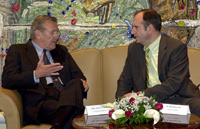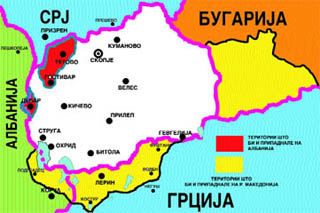Enter content here Wednesday June 6, 08:54 AM
A Macedonian T-55 tank drives on the road to the front line in Ljubodrag village near settlements controlled by ethnic Albanian guerillas June 4, 2001 in the hills north of Skopje. Macedonia's fighters put their weapons aside briefly to allow aid workers to reach civilians trapped by weeks of combat between the army and special forces against rebel ethnic Albanians. REUTERS/Ognen Teofilovski JOINT STATEMENT OF PRESIDENTS TRAJKOVSKI AND STOYANOV. MIA Macedonian President Boris Trajkovski and his Bulgarian counterpart Petar Stoyanov adopted Tuesday in Varna a joint statement on the security situation in Macedonia, the bilateral relations, and the stability of the entire region, MIA's special correspondent reported.
The two Presidents strongly condemn the terrorist acts, committed by Albanian armed groups, which jeopardize Macedonia's peace, security and stability. Trajkovski and Stoyanov call on the terrorists to end the acts of armed violence, to release all hostages, to disarm and to withdraw immediately.
President Stoyanov reiterates Bulgaria's strong support for the sovereignty, territorial integrity and inviolability of the borders of Macedonia.
In their statement, both Presidents support the efforts of the Macedonia Government to stop the violence, expressing assurance that the mechanisms for intensified political dialogue under President Trajkovski's auspices, creates an opportunity to find a solution and consolidate interethnic relations and to ensure better future for all citizens of the Republic of Macedonia.
The Macedonian and Bulgarian Presidents stress their political will to intensify the relations between the two countries in all areas of mutual interest, particularly in the sphere of economy and in establishing the infrastructure that links the two countries, with a priority on the railway Skopje-Sofia, the connection of the countries' power networks through a new 400-volt cable, and the construction of Burgas-Skopje-Vlore oil pipeline. In this respect, the Presidents declare themselves finalizing the Memorandum on Corridor 8, giving priority to the implementation of the projects related to its main route.
At a joint press conference in Varna, upon a visit of the Ferryboat complex, Stoyanov said it was an important point of Corridor 8, while Trajkovski said it had both economic and political significance because "it will enable to people of Macedonia, Bulgaria and Albania to exchange ideas and experiences, eliminating all historic prejudices."
Referring to the Bulgarian media speculations that the Macedonian President was to meet with King Simeon II, Trajkovski said such a meeting had not been planned.
Asked about the international community's efficiency in funding the Stability Pact projects, Trajkovski said that some matters did not only depend on the international community, but also on the initiatives of the involved countries.
Almost all of the Bulgarian newspapers reported on President Trajkovski's visit to Bulgaria, particularly on the agreement of Trajkovski and Stoyanov to invite their Albanian counterpart Rexhep Mejdani for a trilateral meeting on accelerated realization of infrastructure projects on the territory of the three countries.  BUCKOVSKI-RUMSFELD: DIRECT SUPPORT FROM US TO MACEDONIA. MIA Macedonian Minister of Defense Vlado Buckovski met Tuesday with Donald Rumsfeld, US Secretary of Defense.
At the meeting, Buckovski positively evaluated the support that the US has been giving to Macedonia ever since it gained independence.
Mr. Rumsfeld hailed Macedonia's efforts for stabilizing of the situation in the region, and thanked for the logistic support that our country gives to the NATO and KFOR troops.
In regard to the concrete cooperation, Minister Buckovski said that the international community could help Macedonia from many aspects, first of all in regard to the political and financial isolation of the terrorists.
Minister Buckovski also informed Rumsfeld about Macedonia's initiative for establishment of a regional center headquartered in Skopje, which would provide exchange of information between the countries from the region in regard to the weaponry smuggling and organized crime.
US Secretary of Defense Rumsfeld once more underlined the US support to Macedonia regarding the manner how Macedonia deals with the crisis.  Nova Makedonija: Suggestion on New Borders. LORD OWEN: "EUROPEAN METROPOLISES CANNOT BE THE ONLY PLACES TO DECIDE ON THE BALKANS" Sense Berlin, June 5 (SENSE) - When he withdrew from politics to business in 1995, after the unsuccessful mediation between the disputed sides in former Yugoslavia, Lord David Owen, the former British Minister of Foreign Affairs, left in writing: "I would like to be able to leave more specific evidence about the efforts that we undertook in our attempts to restore peace."
In the past six years, those who have continued the Balkan mission of Lord Owen cannot say that they have achieved greater results than him, which leads the British diplomat to the same conclusion that the American mediator Richard Holbrooke came to and this is that on the Balkans "someone can successfully mediate only if he has certain military force in the rear." "NATO back in 1993 had to announce that they would conduct peace plans. Only thus the Bosnian Serbs would surrender in a few weeks," says Lord Owen in his interview for Berliner Zeitung.
But, Owen thinks that the prospects for a complete solution to the problem in the region were reduced back in 1991 when the European Community of that time didn't allow any discussions about the borders. "The European Community thought it was wiser to consider the warnings of their mediator, Lord Carrington, as well as the warnings of the UN Secretary General, Peres de Cuellar, and of the UN mediator, Cyrus Vance. All three of them opposed the recognition of Croatia and Slovenia - not because of the countries themselves, but because of the impact it would have on Bosnia. They predicted war," concludes Owen.
Owen thinks that Milosevic has always been a part of the problem, but also a part of the solution. He, on one hand, "caused the whole thing, when he used the Kosovo problem to grab the power," but for him Kosovo was always a finishing point. Milosevic "was able to be pragmatic about everything else, except Kosovo. Not in one of the many discussions that we had had with Milosevic did we forget to point to Kosovo. He would then become emotional, unpleasant and hard to talk to, and the pragmatism he would show till that moment would disappear," remembers Owen. Kosovo, according to his opinion, did not enter the Dayton Treaty "because Milosevic would have never consent to it."
Lord Owen thinks that it is very good that Europe acts on the Balkans together with the United States and he thinks that "to a certain degree" for a successful action Russia is also necessary. The greatest weakness of the current western politics on the Balkans, according to Owen, is the fact "that too many decisions are made without including the Balkan countries." "We have to stop deciding about the Balkans only in western metropolises," points out Owen.
Commenting on the possibility for creating a new small country on the Balkans, Lord Owen says "it should be clearly said that we won't accept it, if Montenegro declares independence on its own. It has to be a part of a discussion in which all the countries on the Balkans would participate." If Kosovo wants independence - which will happen - then that, according to Owen, "wouldn't harm Serbia." "It all has to be connected: Bosnia and Herzegovina, Kosovo, Macedonia. And we have to be allowed to discuss change of the borders. If Kosovo becomes independent, then that is change of the borders, which without an overall agreement would considerably endanger the stability of the region," thinks Owen, appealing for a new Balkan Conference that would differ from the Berlin Congress from 1878 in the fact that then the European forces decided on one region, and today the Balkan countries would have to participate in the decision-making process.
Commenting on the announcements about reducing the international forces on the Balkans, Lord Owen thinks that "they mustn't be reduced under certain number," but also that Kosovo and Bosnia "cannot be permanently considered protectorates." The British are experienced from the cases in Palestine and North Ireland about how the attitude of the people can turn against the soldiers. "The moment will come when the Kosovo Albanians will go against NATO, because they will realize that NATO hinders their independence," warns Owen. "Those that want to withdraw their troops will have to strengthen their diplomacies first. There are many starting points. The status quo has to end. It doesnt function," concludes Lord Owen in his interview for Berliner Zeitung. Kosovo peacekeepers sent to Macedonia border. Reuters PRISTINA, Yugoslavia (Reuters)- Four hundred NATO-led peacekeepers are being sent to hunt out Macedonian rebel supply routes in a bid by the international community to show it does not back the guerrillas.
Taskforce Juno, made up of British, Swedish, Finnish and Norwegian troops already in Kosovo, is moving into southwestern Kosovo bordering Macedonia and Albania, a spokesman for peace forces in Kosovo, Major Fergus Smith, said on Tuesday.
Thousands of refugees who fled a Macedonian army offensive in March now live in the region, which is secured by Turkish peacekeepers. Rebels also hiked over the mountainous border from Macedonia to Albanian-dominated Kosovo.
Long thought to hold rebel supply routes, the region is the last along Kosovo's border with Macedonia to be reinforced by peacekeeping troops.
"This demonstrates that the National Liberation Army does not have the support of the international community," Smith said. He said the peacekeepers' role was to "interdict supply routes and smuggling routes into and out of the former Yugoslav Republic of Macedonia".
National Liberation Army rebels say they want equal rights for ethnic Albanians. The Macedonian government has branded them terrorists.
The insurgency in northern Macedonia started in February, raising fears the country could be plunged into civil war. Recent fighting has centred around a string of villages in northeastern Macedonia far from the peacekeepers' new deployment.
The new peacekeeping group will set up observation posts in the mountainous region, which locals say was mined previously by Yugoslav forces.
"We hope to intercept any smugglers transiting through the high ground with food or arms we believe would be going to the NLA," Smith said. |



